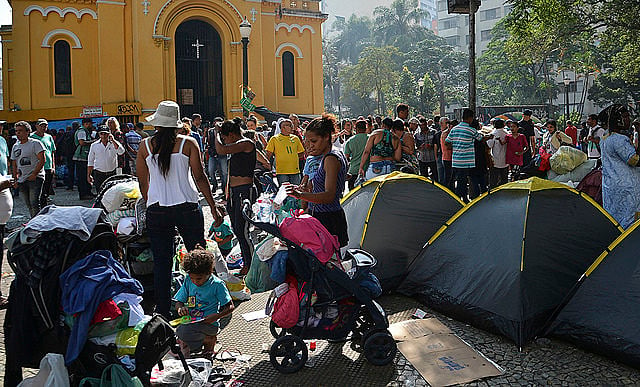On May 1st, the former headquarters of the Federal Police in the center of São Paulo, Brazil, which was being occupied by homeless workers, collapsed after the building caught fire. There were several casualties. The incident was yet another reminder of the housing crisis in the city. The woes of the affected families were made worse by the fact that governor Márcio França avoided taking responsibility for the tragedy and, instead, followed a policy of criminalizing the living situation of homeless workers. Since the incident, the workers who lost their homes in the collapse have been occupying the Largo de Paissandu square.
A month after the incident, the crisis continues for the workers. The Dawn News spoke to Benedito Barbosa, a lawyer who works with people’s movements and a member of the Gaspar Garcia Center of Human Rights (CGGDH), on the struggles being waged by them.
The Dawn: What has been happening in this last month since the tragedy?
Benedito Barbosa: Well, for us, it is obvious that the situation that has resulted from the collapse of the building is challenging. From May 1, the days have been without rest. Unfortunately, as we have said, what happened was a foretold tragedy. The immediate situation of the 150 families who were living in that building is our priority today. Also, it is important to think about how the 2016 coup effectively left us in the movement without tools and resources.
How are the families doing these days?
A camp was built quickly in the square of Largo do Paissandu and we are making all efforts to support the camp, which is also an expression of struggle. In this camp, the homeless workers are struggling, but we are not going to move anywhere without a dignified housing solution. Even President Temer, after visiting the camp, did not have anything to say.
You talked about the foretold tragedy and the effects of the coup. How are they related?
We say the incident was a foretold tragedy because the housing crisis in São Paulo is getting worse every day and Temer’s government promotes policies for the reduction in investments. This directly affects the little resources available for the development of dignified housing. They removed the plans for dignified housing and reduced the social expenditure. This means that more sectors of society are becoming impoverished. We also see that there are sectors that have to invest 80% of their income in housing. Families are returning to the occupation because that is their last option. Nobody is returning just because they want.
What are the possible solutions to this crisis?
If there were a policy supported by the Constitution, it would be a big step. The problem is not the lack of space. The problem is that available space has been intentionally abandoned in order to favor real-estate speculation. There is more empty property than people living on the street. This is a logic that we must overturn. The social role of the private property is guaranteed in the Constitution.
How is the government approaching this issue?
There is a fierce campaign criminalizing the housing struggle. Even earlier, when João Doria was mayor and now, with Márcio França as governor, a repressive policy has been maintained towards organizations. The occupations suffer constant attacks from the police. We get eviction orders once a month. Despite all this, we remain committed. The struggle for dignified housing is one of society's demands from our governments.
Have other sectors reached out in solidarity?
Yes, of course. The housing rights organizations, the MTST (the Homeless Workers’ Movement) and union associations have all expressed solidarity. The Left that continues in the struggle was, is, and will always be with us. It is great to be working shoulder to shoulder with these comrades.
Some basic facts about the housing crisis in São Paulo
– According to 2016 data, São Paulo has a housing deficit of 369,000 homes.
– There are around 1.5 million people living in precarious conditions.
– In the city alone, there are 1,300 empty properties.
– In addition to the housing deficit, there are some 800,000 homes that are in a regularization process.
– The building that collapsed was one of the 133 properties occupied by housing movements in the city.
– The State government has a policy of criminalizing and keeping these occupations illegal.




